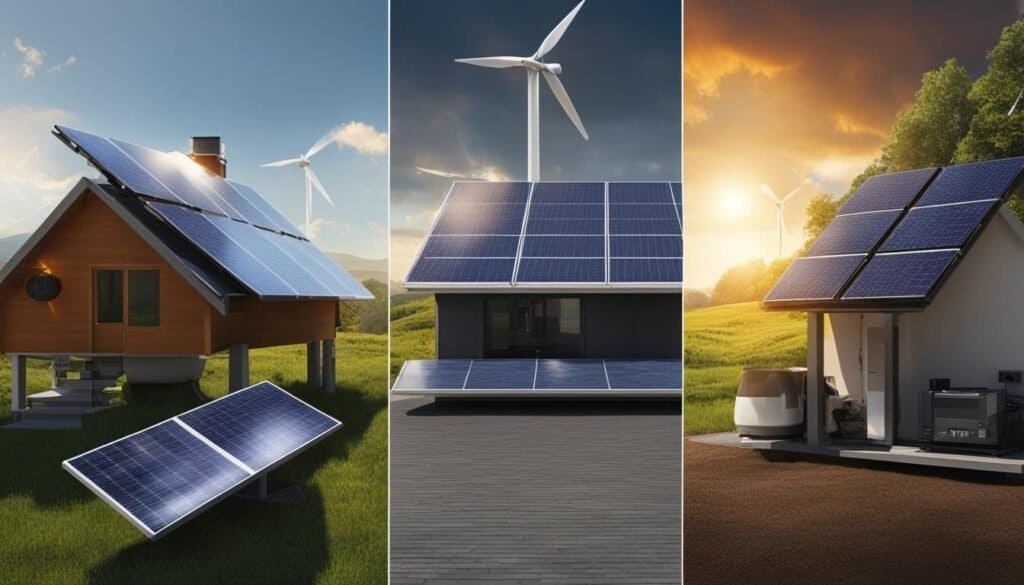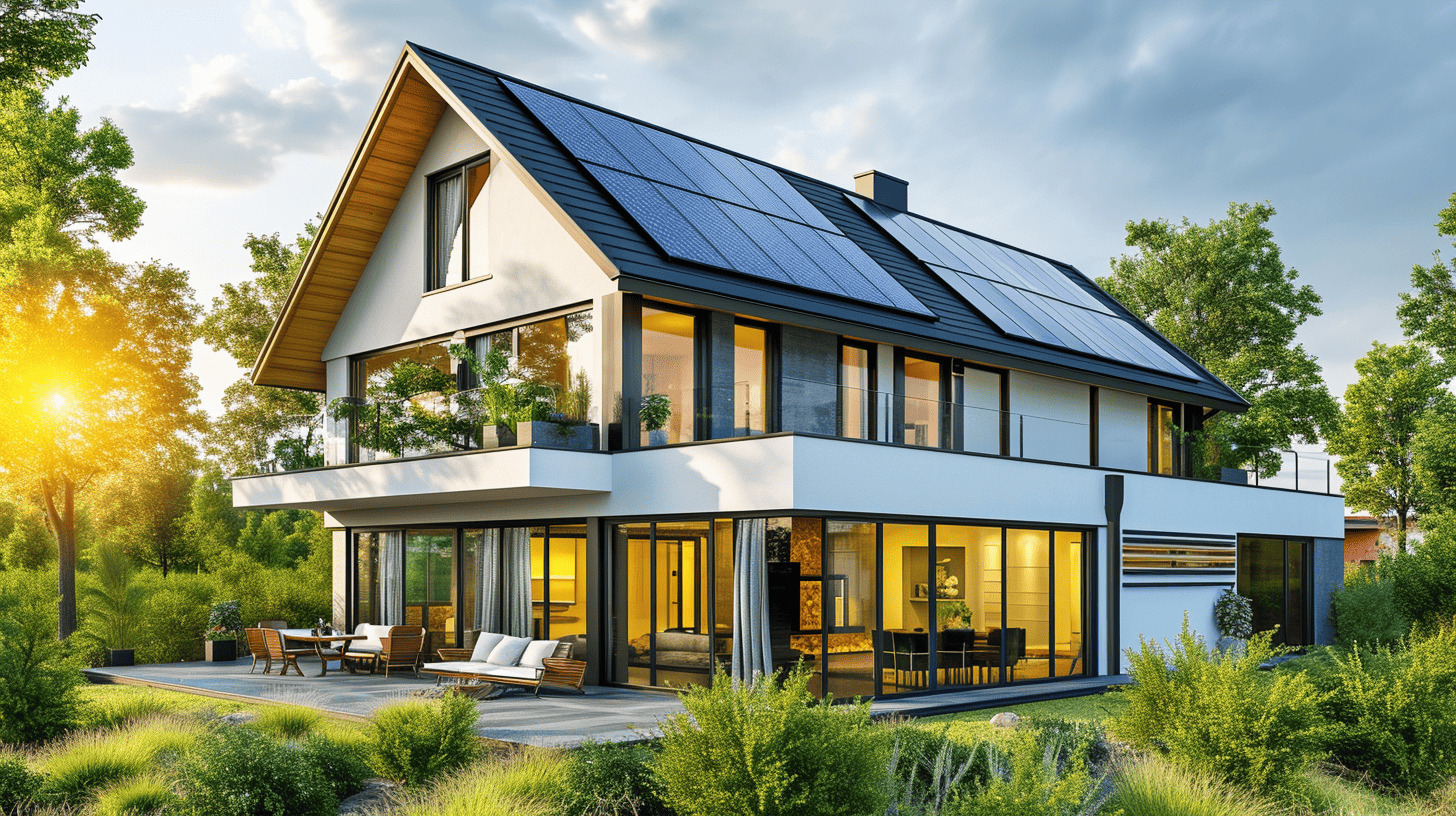Did you know that homeowners like you are increasingly turning to solar-powered energy-efficient products for renewable energy solutions and eco-friendly technology? In fact, the market for green energy products and energy-saving devices is continuously growing. Solar technologies like photovoltaic (PV) systems are now more accessible thanks to reduced costs and improved efficiency.
Leading companies such as SunPower Maxeon and REC provide highly efficient solar panels backed by strong 25-year guarantees, demonstrating their commitment to reliable, long-term energy savings. So, if you’re interested in combating climate change while enjoying reduced energy bills and predictable energy pricing, it’s time to explore the fantastic world of solar-powered innovations.
Key Takeaways
- Solar-powered products help reduce energy bills and contribute to eco-friendly living.
- Technologies such as photovoltaic systems have become more affordable and efficient in recent years.
- Companies like SunPower Maxeon and REC offer high-quality solar panels with strong warranties, ensuring long-term energy savings.
- Homeowners are increasingly adopting solar energy solutions to combat climate change and secure predictable energy pricing.
- The market for solar innovations is thriving, with various products catering to different needs and preferences.
Embracing the Sun: The Rise of Solar-Powered Energy Solutions
The solar energy sector is experiencing a significant boom, with a 40% increase in residential solar installations in 2022 compared to the previous year. This growth trajectory is likely to continue, supported by the appeal of 30% tax incentives for solar investments and a collective drive towards sustainability. Homeowners are adopting solar panels not just to shrink carbon footprints but also to lock in energy costs amidst price volatility and inflation.
Solar Attic Fan: Energy Theory highlights the benefits of a solar attic fan for ventilating hot air from spaces like attics, garages, and greenhouses, thereby enhancing the efficiency of HVAC systems.
The solar landscape is increasingly influenced by concerns over climate change, prompting homeowners to contribute to emission reductions by adopting renewable energy solutions like solar power. As the technology behind solar solutions continues to advance, people are finding more efficient and cost-effective ways to utilize this form of clean energy.
According to the U.S. National Renewable Energy Laboratory (NREL), solar power could provide up to 45% of the nation’s electricity by 2050, highlighting the significant potential of this ever-evolving sector.
An examination of some of the key factors driving the growth in solar energy adoption reveals that in addition to the environmental benefits, solar technology has become more accessible and cost-effective.
- The cost of solar panels and installation has decreased dramatically over the past decade, making it more affordable for the average homeowner.
- Growing awareness of the benefits of clean energy solutions is driving increased interest and demand for solar technology.
- Government incentives and rebates, such as the 30% federal tax credit, make solar installations even more attractive for homeowners seeking long-term cost savings on energy bills.
| Year | Residential Solar System Average Price | Annual U.S. Solar Installations |
|---|---|---|
| 2010 | $29,865 | 883.00 MW |
| 2013 | $23,755 | 4,751.00 MW |
| 2016 | $17,985 | 14,807.00 MW |
| 2022 | $10,000-$15,000 (estimated) | 40% projected increase |
In conclusion, rising interest in sustainability combined with technological advancements in solar power is making solar solutions more accessible and attractive to homeowners. These factors, alongside government incentives, have led to a significant boom in the solar energy sector, adding to the overall rise of solar-powered energy solutions. As the world turns to greener practices in an effort to combat climate change, solar energy is poised to play a crucial role in shaping our energy future.
The Top Solar Panels for Energy-Efficient Homes
When it comes to energy-efficient homes, selecting the right solar panels is crucial to maximize the benefits of renewable energy. Leading the solar panel market are SunPower Maxeon and REC panels, known for their high efficiency and longevity. However, other reputable brands like Panasonic, Canadian Solar, and QCells also offer strong performance and warranties, catering to various homeowner needs.
Factors like panel efficiency, temperature coefficients, warranty length, and production guarantees at 25 years are critical in assessing the quality and potential savings from solar panels.
Let’s take a closer look at the top solar panel brands and what makes them stand out:
- SunPower Maxeon: High-efficiency solar panels with an industry-leading 25-year warranty.
- REC: Renowned for their long-lasting, high-performance photovoltaic panels.
- Panasonic: Offers panels with competitive efficiency and temperature coefficient ratings, despite being slightly smaller in size.
- Canadian Solar: Known for manufacturing some of the most efficient solar panels in the market.
- QCells: Dominates the U.S. residential market with cost-effective solar solutions.
Each solar panel brand offers unique benefits, making it essential to evaluate different factors while choosing the right panel for your home. Here is a comparison table of the top solar panel brands based on key metrics:
| Brand | Efficiency (%) | Temperature Coefficient | Warranty (Years) |
|---|---|---|---|
| SunPower Maxeon | 22.8 | -0.29%/°C | 25 |
| REC | 21.7 | -0.26%/°C | 25 |
| Panasonic | 20.3 | -0.258%/°C | 25 |
| Canadian Solar | 20.4 | -0.37%/°C | 25 |
| QCells | 19.9 | -0.35%/°C | 25 |
Investing in high-efficiency solar panels from reputable brands is a key step toward creating an energy-efficient home powered by renewable energy. By considering the factors mentioned above, homeowners can make an informed decision, selecting the ideal solar panels for their individual needs and contributing to a more sustainable future.
Solar-Powered Gadgets: Combining Convenience with Sustainability

As the demand for renewable energy solutions and eco-friendly technology grows, innovative solar-powered gadgets are emerging to provide convenient and sustainable options for everyday use. From solar chargers to solar-powered home appliances, these environment-friendly gadgets offer energy-saving benefits while catering to a variety of needs and preferences.
Solar Chargers and Portable Power Banks
Solar chargers and portable power banks exemplify the merger of convenience and sustainability, offering device charging capabilities utilizing solar energy. These portable gadgets make it possible to tap into renewable energy sources on the go, ensuring devices remain powered without relying on conventional electricity sources, thereby reducing one’s carbon footprint.
“Solar chargers are an essential tool for avid hikers, campers, and anyone in need of on-the-go renewable energy solutions.”
Solar-Powered Home Appliances
Modern home appliances are also undergoing a transformation as companies develop solar-powered refrigerators, solar air conditioning systems, and other energy-efficient household equipment. Designed to operate efficiently with solar energy, these appliances help households reduce their reliance on grid power and fossil fuels while promoting a greener home environment.
Here are some examples of sustainable solar products for the home:
- Solar-powered refrigerators
- Solar air conditioning units
- Solar water heaters
Outdoor Solar Accessories for Energy Saving
Outdoor solar accessories, such as lighting solutions and water features like solar-powered fountains, enhance living spaces while offering energy savings. These products, which draw power from the sun, provide decorative and functional value without contributing to the household’s energy consumption, thus supporting energy conservation efforts.
| Product | Category | Description |
|---|---|---|
| Solar pathway lights | Lighting | Illuminate walkways and gardens using solar energy |
| Solar-powered fountain pump | Water feature | Create a relaxing ambiance in your garden or patio with a solar-powered fountain |
| Solar LED string lights | Decorative lighting | Enhance your outdoor space with energy-efficient decoration |
Incorporating solar-powered gadgets into your lifestyle not only conserves energy but also contributes to a more sustainable future. Embracing these innovative products demonstrates a commitment to eco-friendly living while enjoying the convenience and practicality they provide.
Integrating Solar Energy into Your Daily Life
Living a solar energy lifestyle involves incorporating practical solar solutions into your daily life. This can be achieved in various ways, from installing rooftop solar panels to participating in community solar programs. Incorporating solar energy into everyday living offers both economic and environmental benefits, fostering a green and sustainable future for homeowners and their communities.
For homeowners who lack suitable rooftops or live in shared communities, community solar initiatives provide an excellent opportunity to harness the power of the sun collectively. By sharing costs and benefits of a single solar array, these programs make solar energy usage a joint effort, allowing participants to reduce their carbon footprints and contribute to sustainability.
“In a community solar program, multiple households or businesses share the energy produced by a single solar array. This allows individuals to reap the many benefits of solar power, even if they do not have suitable rooftops for solar panel installations.”
Another valuable resource for integrating solar energy into your daily life is the availability of tools like the U.S. Department of Energy’s Solar Energy Technologies Office’s (SETO) PVWatts calculator. This user-friendly resource calculates potential solar energy production, enabling you to assess the practicality of solar installations for your individual home.
- Enter your home address in the given input field on the PVWatts website.
- Adjust the system size, module type, and other parameters as needed.
- Review and analyze the predicted energy production and cost savings provided by the calculator.
- Evaluate the feasibility and benefits of solar installation for your specific situation.
As you consider adopting solar energy in your daily life, it’s essential to factor in your unique needs and constraints regarding system size, budget, and location. By embracing practical solar solutions and becoming an active participant in the green energy revolution, you can create a lasting impact on the environment and your community.
Solar Innovations: Exciting New Products on the Market
The solar market continues to burgeon with advanced solar panel technologies, high-performance solar panels, and the latest solar innovations to meet the needs of the eco-conscious consumer. This wave of sustainable tech allows for the creation of solar-powered smart gadgets, bringing the solar-powered smart home dream closer to reality. Let’s explore some of these exciting new products in the solar space.
Advanced Solar Panel Technologies
High-grade cobalt-free LiFePO4 cells have emerged as some of the most advanced in the industry, delivering robust power and fast charge/discharge rates. Innovative Battery Management System (BMS) solutions, like those provided by Discover® Advanced Energy System, play a crucial role in ensuring these batteries operate with peak efficiency and longevity.
The advancements in solar technology deliver long-lasting and efficient energy to consumers.
Smart Solar Devices for the Eco-Conscious Consumer
Solar-powered smart gadgets allow users to harness solar energy in their daily life. Some of these smart solar devices include solar-powered calculators, smart home integrations, and energy monitoring systems.
- Solar-powered calculators – Perfect for both students and professionals, these calculators rely on solar energy to operate, eliminating the need for conventional batteries.
- Smart home integrations – These systems manage various solar-powered appliances and devices within a home, providing greater energy efficiency and control over power consumption.
- Energy monitoring systems – By tracking energy use in real-time, homeowners can make better decisions to reduce energy consumption and optimize their solar-powered systems for maximum efficiency.
Solar-Powered Smart Home Integration
Consumers are increasingly excited about integrating energy-efficient smart technology into their homes. Solar-powered smart home innovations enable multiple gadgets and appliances to form a coherent, manageable system that offers several benefits, including:
- Solar-based heating systems – These systems heat the home using the power captured by solar panels, increasing energy efficiency and reducing dependence on natural gas or electricity.
- PV modules powering smart thermostats or security systems – Any number of smart devices can be powered by solar energy, further reducing a household’s carbon footprint.
- Integration gateways like Discover’s LYNK II – Communication between solar battery systems and home automation networks is made seamless, offering a user-friendly experience in managing the home’s energy.
In conclusion, the solar market’s rapid expansion has paved the way for advanced solar panel technologies and smart solar devices. These innovations cater to the eco-conscious consumer’s desire for a solar-powered smart home. By integrating energy-efficient smart technology into our daily lives, we’re making strides toward a more sustainable and greener future.
Investing in Solar: Costs and Incentives for Homeowners

As the demand for solar technology rises, a variety of financial options are available for homeowners who want to invest in solar energy, helping to make this renewable energy source more accessible. Understanding the costs and incentives associated with different investing options is key to making an informed decision.
Homeowners can choose from several financing options, including:
- Direct purchases
- Loans
- Leases
- Power Purchase Agreements (PPA)
These options are influenced by factors such as local permitting costs, labor prices, and the scale of the installation, all of which can impact the overall cost of adopting solar technology.
One major incentive supporting the adoption of solar energy is the Solar Investment Tax Credit (ITC), which offers a 26% tax credit for systems installed between 2020 and 2022 and a 22% tax credit for systems installed in 2023.
For those looking to navigate the incentives and regulatory policies surrounding renewables in the United States, the DSIRE database (Database of State Incentives for Renewables and Efficiency) serves as a comprehensive resource.
Additionally, homeowners should consider the long-term benefits of investing in solar. Not only can they expect to see a reduction in their electricity bills, but they are also contributing to a cleaner, more sustainable future for the planet.
In conclusion, understanding the available financing options, incentives, and regulations related to solar investment is crucial in making well-informed decisions for homeowners. By investing in solar technology, individuals can enjoy both financial and environmental benefits, ultimately contributing to a greener, more sustainable future for all.
Installation and Maintenance of Home Solar Systems
Proper installation and maintenance of solar systems are vital for optimal performance. Certified professionals, many of whom are NABCEP-awarded, ensure high-quality installation using industry-standard solar equipment. While the initial cost and associated “soft costs” such as inspection and permitting can vary, they are on a downward trend, contributing to solar affordability. Homeowners are encouraged to consult with local solar companies to understand the specific requirements and to secure the proper maintenance needed for long-term solar system efficiency.
When approaching home solar system installation, homeowners should consider the following steps:
- Evaluate your home’s solar potential and energy-saving potential, taking into account factors such as roof type, orientation, and shading.
- Review financial incentives and solar policies relevant to your location.
- Obtain multiple quotes from local, certified solar installers and compare costs, equipment, and warranties.
- Sign a contract with a reputable solar installer and allow them to handle the permitting and installation process.
- Once the solar system is operational, monitor its performance and report any issues to the installer for prompt resolution.
Regular maintenance of solar systems is critical to ensure the efficiency and longevity of your investment.
Maintenance of solar systems typically involves periodic visual inspections, cleaning, and tune-ups. Some tasks can be performed by the homeowner, while others may require a professional:
| Task | Description |
|---|---|
| Visual Inspections | Regularly examine solar panels and system components for signs of dirt, debris, and damage. This can be done quarterly or as needed, depending on the location and environmental conditions. |
| Cleaning | Clean solar panels by rinsing with water or using a gentle solar panel cleaning solution to remove dirt and dust that can hinder efficiency. This is typically necessary once or twice a year, depending on your local environment. |
| Professional Tune-Ups | At least once every five years, have a certified solar installer or technician perform a comprehensive check-up, including tightening electrical connections, optimizing system settings, and addressing any potential issues. |
In conclusion, proper installation and maintenance of home solar systems are essential to maximize their performance and value. By working with NABCEP-certified solar installers and keeping up with routine maintenance tasks, homeowners can continue to enjoy the benefits and sustainability offered by their solar investment.
Real-Life Impact: Testimonials and Case Studies on Solar Adoption
As the adoption of solar energy continues to surge, it’s important to learn from the real-life experiences of homeowners who’ve already made the transition. Testimonials and case studies on solar provide valuable insights into what drives solar adoption, how it benefits households, and the overall impact on communities and the environment. Here, we explore the stories of three individuals who’ve made the switch to solar energy.
“Our solar installation has been one of the best decisions we’ve ever made. Not only are we able to reduce our utility bills significantly, but we also enjoy the satisfaction of leading a more environmentally responsible life.” – Lauren, Pennsylvania
Lauren’s story illustrates the financial and personal rewards of embracing solar energy. Her decision to invest in solar panels was driven by the desire to reduce her family’s carbon footprint while securing the potential long-term savings connected to minimizing energy costs.
Table: A snapshot of solar adoption case studies
| Homeowner | Location | Solar Component | Key Takeaways |
|---|---|---|---|
| Lauren | Pennsylvania | Residential rooftop solar panels | Decreased utility bills, environmentally responsible |
| Tom | California | Solar-powered home appliances | Energy savings, sustainable living, increased home value |
| Stephanie | Arizona | Community solar program | Shared savings, collaboration, increased access to solar |
Tom, a California resident, opted for a combination of solar panels and energy-efficient home appliances. He found that his decision not only yielded lower energy bills but also contributed to the value of his property.
“Integrating solar has been transformative for our home. We’ve seen significant energy savings and our property value has increased. It feels great to minimize our ecological impact.” – Tom, California
For individuals like Stephanie in Arizona, joining a community solar program played a crucial role in her solar journey. This type of program allowed her and her neighbors to share costs and benefits of a single solar array, expanding access to renewable energy for those who might not have the space or resources to install their own solar panels.
“Our community solar program has been such a positive experience. It’s allowed us to save money and be kinder to the environment as a collective. It’s democratized access to solar energy for those of us who couldn’t go it alone.” – Stephanie, Arizona
Through these testimonials and case studies on solar, it’s evident that homeowners across the United States are harnessing the power of the sun in various ways – whether through rooftop panels, solar-powered appliances, or participating in community solar programs. The benefits range from financial savings to environmental stewardship, highlighting the far-reaching impact of solar adoption on individuals and communities.
Embracing a Solar-Powered Lifestyle: The Path to Sustainable Living
As the adoption of solar-powered energy-efficient products continues to grow, we are witnessing a remarkable transformation toward a more sustainable and resilient energy future. By exploring various solar solutions, homeowners can take advantage of renewable energy sources to reduce their impact on the environment, secure predictable energy pricing, and actively support energy conservation efforts. The numerous benefits of solar energy make the journey towards a solar-powered home an investment not just in personal financial well-being, but also in promoting eco-friendly living and preserving our planet for generations to come.
Homeowners in the United States have access to an impressive array of solar innovations that cater to a wide range of needs and preferences. From high-efficiency solar panels offered by leading brands like SunPower Maxeon and REC to a vast assortment of solar-powered gadgets and appliances, the options available make integrating solar power into daily life a practical and achievable goal. Furthermore, community initiatives and financial incentives such as the Solar Investment Tax Credit (ITC) serve as additional motivation for homeowners to actively participate in forging a sustainable energy future.
By investing in solar technology and incorporating solar-powered products into our homes and routines, we are doing more than merely adopting an eco-friendly lifestyle: we are making a statement about the importance of sustainability and our collective responsibility towards combating climate change. As solar energy becomes increasingly prominent in our lives, the hope for a cleaner, greener, and more sustainable future becomes a tangible reality that we can all contribute to. So why wait? Now is the optimal time to embark on your very own solar-powered journey and participate in the global effort to create a more sustainable world for us all.
FAQ
What are the benefits of solar-powered energy-efficient products?
Benefits of solar-powered energy-efficient products include reduced energy bills, predictable energy pricing, increased sustainability, reduced dependence on fossil fuels, and reduced carbon emissions. These products also support the global transition to renewable energy solutions and eco-friendly living.
What are some popular solar-powered gadgets and appliances?
Some popular solar-powered gadgets and appliances include solar chargers, portable power banks, solar-powered refrigerators, solar air conditioning, solar-powered fountains, and solar-powered outdoor lighting. These products offer both convenience and sustainability for homeowners looking to reduce their energy consumption and environmental impact.
How can homeowners integrate solar energy into daily life?
Homeowners can integrate solar energy into daily life by installing solar panels on their rooftops, using solar-powered gadgets, participating in community solar programs, adopting energy-efficient appliances, and incorporating solar-powered smart home integrations. Tools like SETO’s PVWatts can help homeowners calculate potential energy production, assisting in evaluating the practicality of solar installations.
What financial incentives are available for investing in solar energy?
Financial incentives available for investing in solar energy include tax credits, loans, leases, and power purchase agreements (PPAs). Homeowners can take advantage of the Solar Investment Tax Credit (ITC), which offers a 26% tax credit for systems installed in 2020-2022 and 22% for 2023. Resources like the DSIRE database provide comprehensive information on incentives and regulatory policies supporting renewables across the U.S.
How can homeowners ensure proper installation and maintenance of their solar systems?
Homeowners can ensure proper installation and maintenance of their solar systems by working with certified professionals, such as NABCEP-awarded installers, using industry-standard solar equipment, and following best practices for maintenance. Consulting with local solar companies can help homeowners understand specific requirements and secure the proper maintenance needed for long-term solar system efficiency.





Leave a Reply